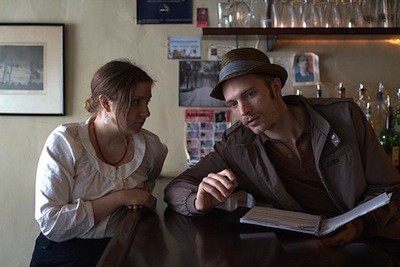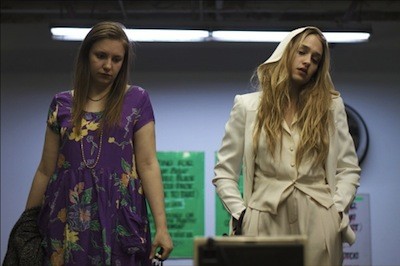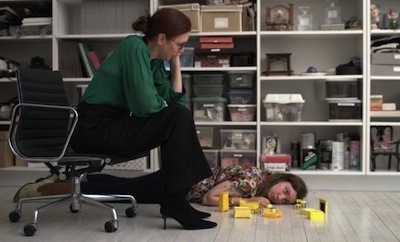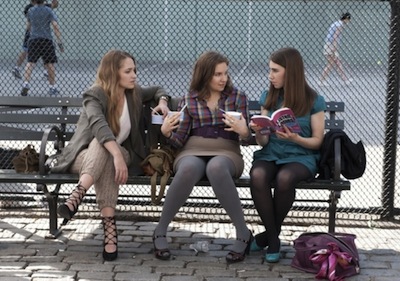
Aura just graduated from college, getting a film degree and a YouTube video of herself frolicking in a bikini in the school fountain to go with it. Her name is ironic, because though it conjures hippy-dippy images of love and happiness, Aura is more like a plague of whining. The movie Tiny Furniture is the story of what she does immediately after school. The grad returns to her home in Tribeca to sponge off her artist mother, squabble with her little sister, reconnect with old friends, and chase after the wrong men. She also gets a job, but the subject of her future is something she's actively avoiding. I don't think she ever says she doesn't know what she wants to do, it's more that she doesn't want to think about it.
Engaging with the disengaged can be tough sometimes. So it is with Tiny Furniture. There is clearly ambition on display here: not for nothing, Lena Dunham has it together enough to assemble a whole movie. This is Dunham's first feature, and she wrote, directed, and starred in the thing, shooting it on a miniscule budget in her mother's real apartment, and roping her real-life mother and sister--Laurie Simmons and Grace Dunham--into putting up with her on the screen. One can't presume to say that this movie is autobiographical, but it is a little surprising that, given the opportunity to dream up an imaginary life for herself, Lena Dunham went for such an uninteresting one.
The story of Tiny Furniture basically covers two weeks of Aura in freefall. Just prior to leaving school, her boyfriend of two years dumped Aura to go find himself. It's a split that is given little credit, though it's thematically significant. In fact, if you consider the men that Aura gloms on to once she is back in New York, it becomes clear that this is a woman currently letting others define the world around her. The vain and selfish Jed (Alex Karpovsky) is pursuing television deals for his own YouTube vids, though from what we see he's not nearly as funny as he thinks he is, while the emotionally manipulative hipster Keith (David Call) is a sous chef in the restaurant where Aura briefly works. Aura is attracted to Keith because he has something he cares about: food. Or so she says. By all evidence--and the film proves our first impressions right--Keith just cares about pills and sex. And tentacle porn. Seriously, ladies, if a guy tells you he's into tentacle porn, it shouldn't be considered a mark in the plus column.

Two of the best scenes in Tiny Furniture actually come as a result of these sorta hook-ups. Midway through the movie, Dunham gives herself actual conversations with both men, where the poses fall away and people actually talk to one another rather than work their way around the mealy-mouthed punchlines that otherwise serve as humor. In terms of comedy, there isn't much that made me chuckle here. The script is like a Noah Baumbach rough draft, the outline of jokes the writer might make before he does the soul searching to give his quips meaning. The only real laughs come from Aura's best friend Charlotte (Jemima Kirke), a spoiled rich girl who has transformed her malaise into withering scorn that somehow becomes more comical by being delivered in a fake British accent. The rest of the laughter comes from the horror of how sad this all really is--and not in a good "laughing with you" satirical way, either. By the time we get to a terrible and awkward sex scene that serves as the film's climax (pun not intended by me, but possibly intended by the filmmaker), it would seem that the nausea and disgust is intentional. The boredom, however...?
In terms of filmmaking, Dunham and cinematographer Jody Lee Lipes don't do a bad job. Though Tiny Furniture is light on planned aesthetics, there are occasional inspired set-ups. The pair make good use of the large apartment Aura's family lives in, shooting through doorways and using walls as natural dividers. In one shot, Aura is laying on the couch while her overachieving sister, who towers over her in accomplishment and stature, is only visible as a pair of legs on a treadmill. It makes for a good contrast. The rest of the film is mostly static, though it thankfully avoids the shaky-cam we have come to expect from most mumblecore features--"mumblecore" being the almost-genre Tiny Furniture most closely resembles. The performances here fit that movement, with all the actors under-acting in an attempt to appear "real." It doesn't work for Dunham or her cast. This feels like a production that never got out of rehearsals.
Tiny Furniture does end on a positive note. The last scene, following the bad sex, features the first real communication of the film. Aura and her mother stop bickering and actually talk, and connections are made between the generations that suggest that Aura's predicament is not only normal, but that things will get better. The insight is maybe too little, too late, but it gives me hope that maybe Lena Dunham could eventually figure this whole cinema thing out, too.


POSTSCRIPT: This review was originally written when Tiny Furniture was released theatrically, so there has been some time to see if the auteur would deliver on the more promising aspects of her creative endeavor. Dunham's new project is helming a sort-of sitcom for HBO. Girls is produced by Judd Apatow and is set to debut this year. I've seen the pilot, and though having a strong producer has helped in terms of tightening the material structurally, I am afraid in terms of the things that concern Dunham and how she presents herself, what we've seen is what we're going to get. Girls is more of the same and, unless there is significant development in the episodes that follow, it's likely only going convince detractors that we were altogether too kind to give credit where we perceived it to be due.
POSTSCRIPT 2: Now that the whole season has run its course, I have done a complete 180 on Girls. Please read this update.

Still from Girls

1 comment:
I don't know - I actually enjoyed this one. Which is pretty odd, because I usually never really like "those" types of films. One thing I really appreciated was how real it felt - it wasn't like a documentary or anything, but it felt more honest than usual. But I can see your argument - the film was really good, but it never soared. Nice review.
Post a Comment